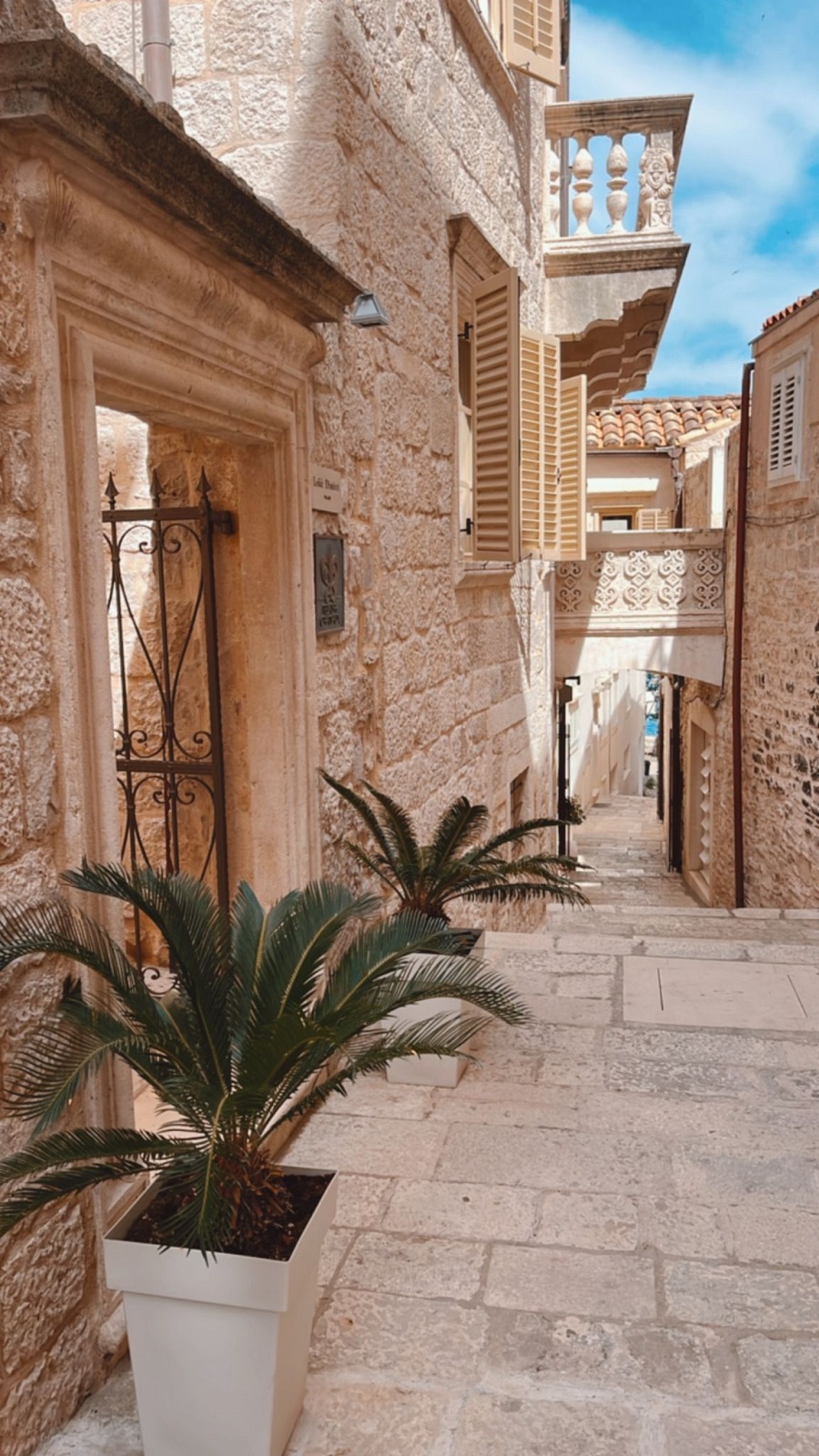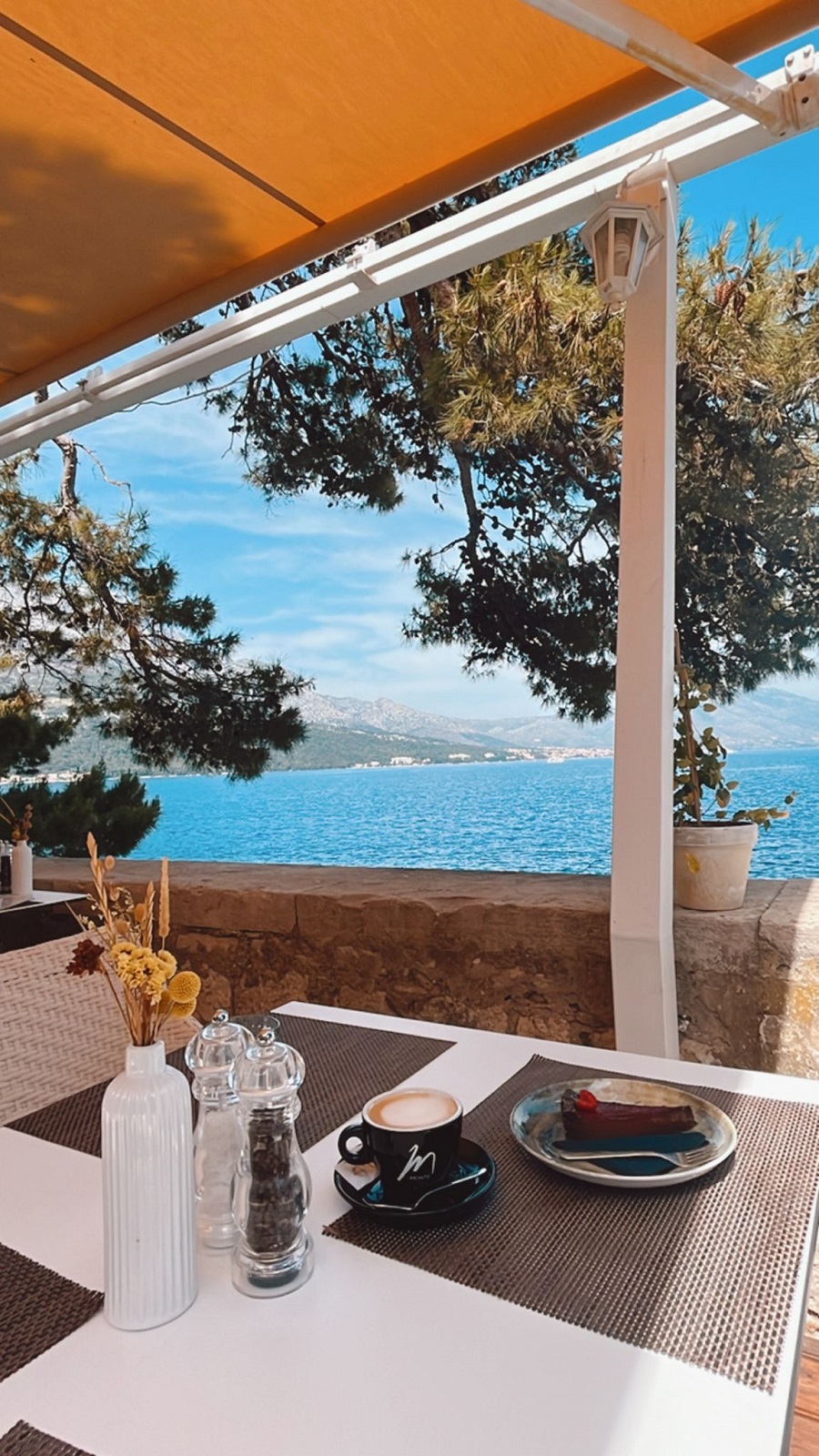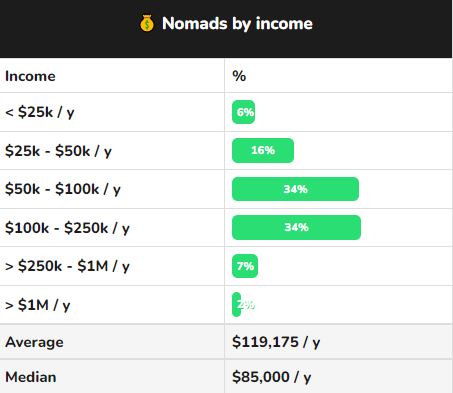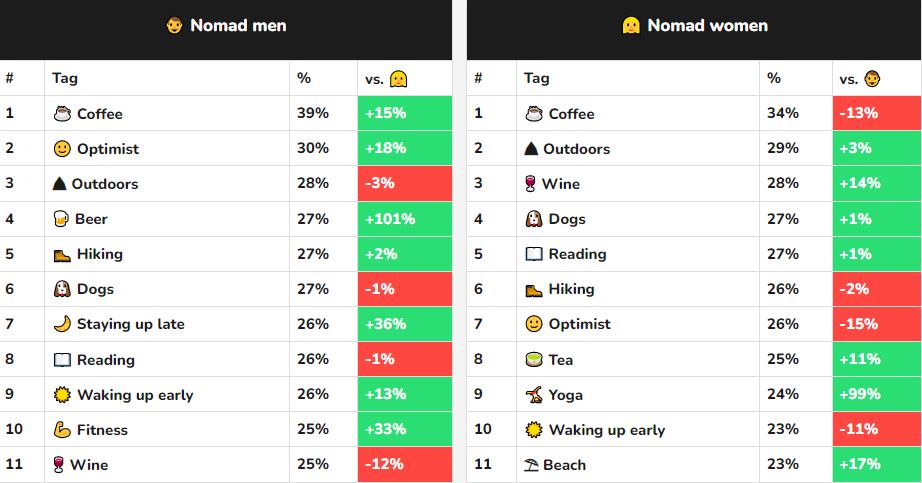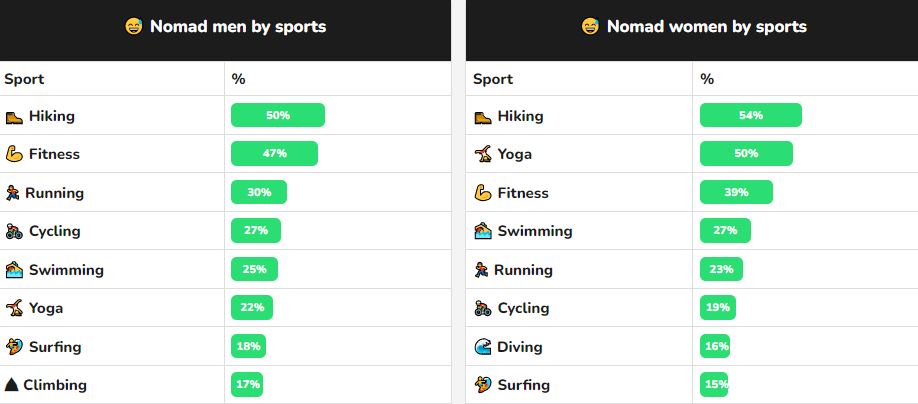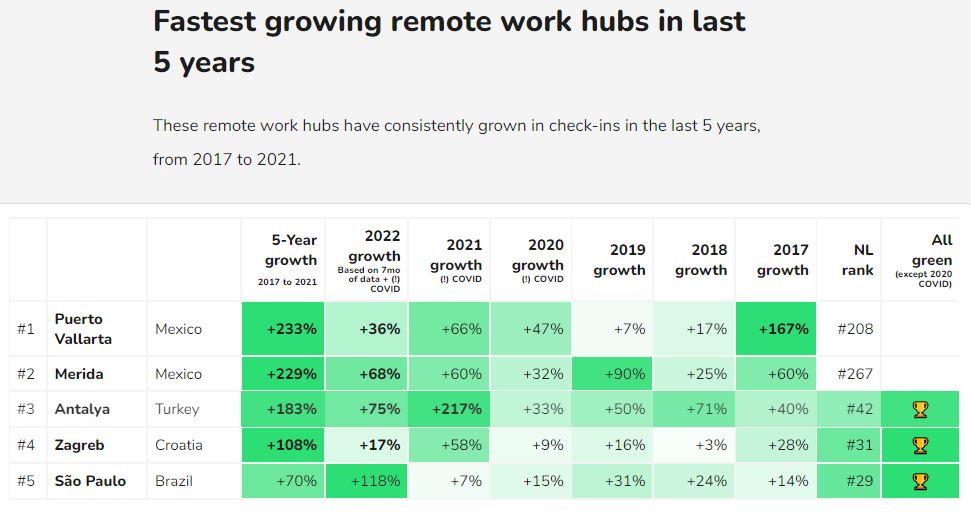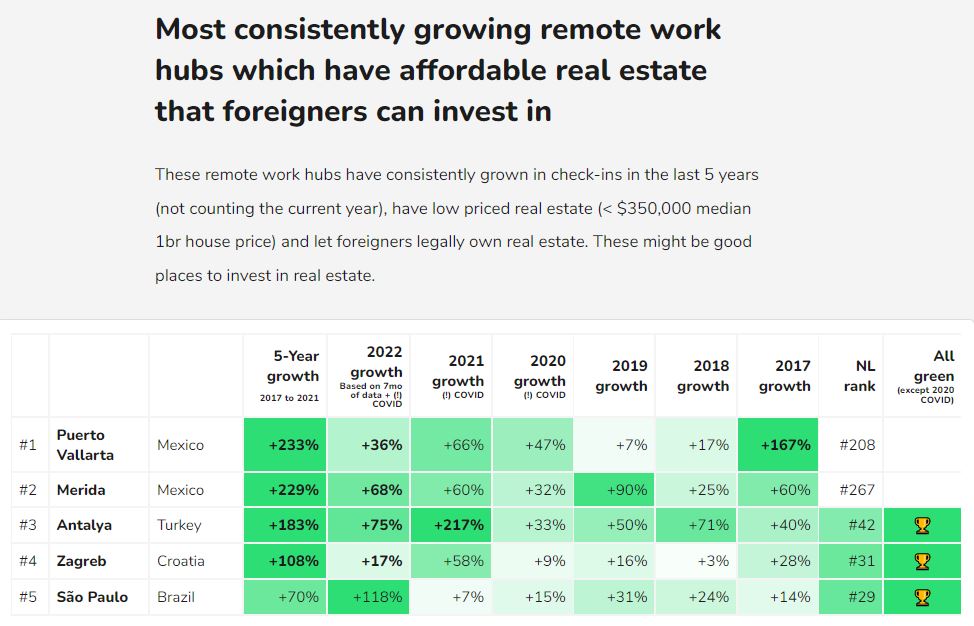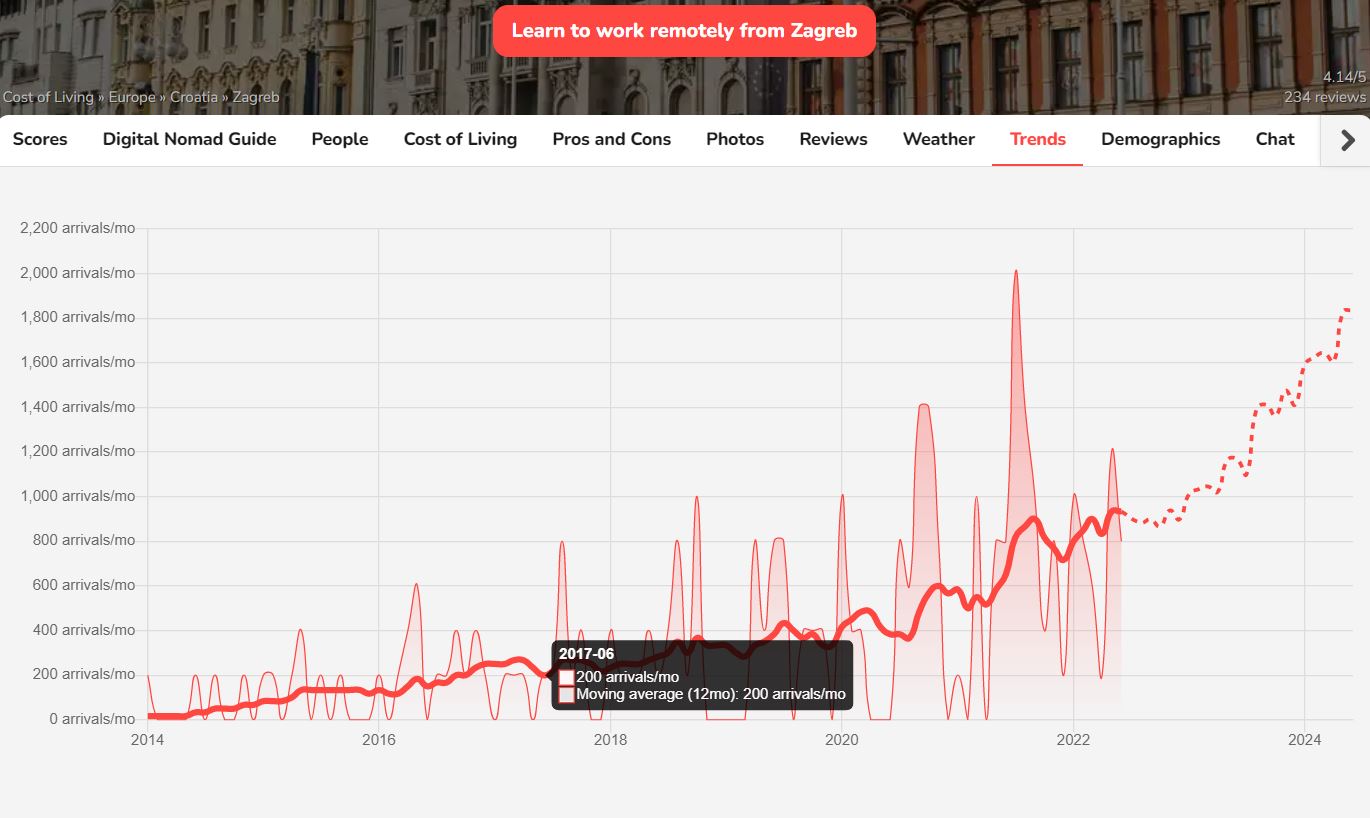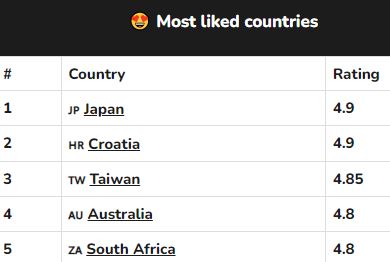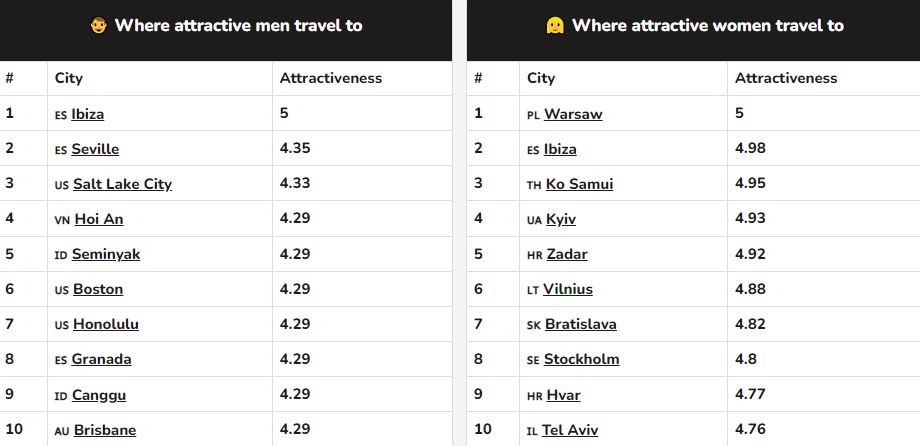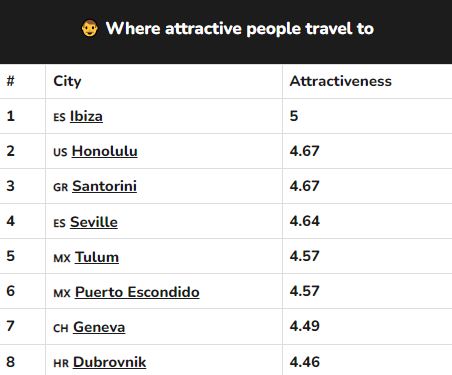Three Out of Four Croatians Planning to Go on Summer Holidays
ZAGREB, 3 July 2022 - The findings of a survey conducted by the IMPROVE pollster for the Mastercard company among 1,010 respondents in Croatia show that 74% of them are planning summer holidays.
This is an increase of 20 percentage points compared to the pandemic year 2020.
Broken down by type of accommodation, a majority of the respondents prefer private accommodation, that is 52% of those polled in the Masterindex survey.
Thirty-five percent (35%) are planning to stay at at their own summer retreats or at their relatives' properties.
Hotel accommodation comes third (18%), and mainly respondents with monthly wages above 9,000 kuna choose this option.
A mere 7% of Croats opt for camping during summer holidays.
As many as 56% of the respondents say they have booked accommodation online, via specialised web sites and websites of travel agencies.
Cosmin Vladimirescu, Country Manager Romania and Croatia at Mastercard, is quoted as saying that before a final decision on booking, an average tourist visits 38 websites of relevant agencies or specialised sites.
For more, check out our lifestyle section.
Central Bank Governor: Growth Rate in 2022 Over 5%, Recession Possible in 2023
ZAGREB, 3 July 2022 - Croatian National Bank (HNB) governor Boris Vujčić said on Sunday he expected growth of over 5% this year, significantly more than currently forecast, and that a possible stoppage of gas deliveries could lead to a recession next year.
Speaking at the opening of the HNB's 28th economic conference in Dubrovnik, he said the growth rate in Q1 was 7% and that in Q2 it could be higher.
In Q3 we have very good bookings in tourism, so a better season can be expected than in the record year for tourism, 2019, "not so much because of more arrivals as because of higher prices by as much as 40%," Vujčić said.
Three quarters will be very good and economic growth can be expected to slow down in Q4, he added.
The biggest risk is neither inflation nor interest rates but the energy market situation, with a possible stoppage of gas deliveries, which could lead to a recession in 2023, Vujčić said, adding that the HNB expected inflation to continue to increase by the middle of this year and the 2022 inflation rate close to 10%.
The inflation in Croatia as well as other countries is primarily a consequence of energy and food price rises, and energy prices depend to a large extent on the war in Ukraine, although they began rising before that, he said.
As long as the situation is such, it's difficult to expect energy price growth to calm down, although the base effect will change, he added.
During the pandemic crisis, energy prices were at a historical minimum and are now rising because of increasing demand and economic recovery, the war in Ukraine causing additional pressure, Vujčić said, adding that it was up to the government to decide which instruments to use to impact food and energy prices.
"The longer this crisis lasts, the emptier the bag with those instruments," he said, adding that it was in Croatia's interest to change to the euro with the smallest impact on prices and that due to the high inflation, the effect would be marginal.
A bigger concern is the rise in energy and food prices for other reasons, Vujčić said.
"The effect is already positive because of the announced change of the rating and on the financial market because at the moment Croatia has lower financing and borrowing costs... The markets have incorporated that in interest rates. In EU countries outside the euro area, interest rates are much higher than in Croatia."
The long period of low and negative European Central Bank interest rates caused the money to move to the real estate sector, which contributed to the rise in property prices, Vujčić said.
"A large part of that rise does not come from loan-financed buying, About 50% of all transactions are without loans, so there is no major risk for the stability of the banking system," he said, adding that due to the rise in prices, real estate was less affordable for young people and first-time buyers. "The rise of interest prices will reduce the pressure on the real estate market."
The Dubrovnik conference will discuss post-pandemic crisis challenges and focus on inflation.
Vujčić said that since Croatia would join the euro area on 1 January 2023, the conference would also discuss European fiscal rules, monetary policy, and the expected interest rate growth as well as "problems in supply chains, which lead to price rises and production standstills, and the energy crisis as a consequence of geopolitical tensions and the war in Ukraine."
For more, check out our politics section.
Croatia Reports 813 New Coronavirus Cases
ZAGREB, 3 July 2022 - In the last 24 hours, 813 coronavirus cases, out of 2,798 tests, and six related deaths have been registered in Croatia, the national COVID-19 crisis management team said on Sunday.
There are 6,336 active cases, including 275 hospitalized patients, five of whom are on ventilators, while 3,142 persons are self-isolating.
To date, Croatia has registered 1,151,466 coronavirus cases, the death toll is 16,079, and 70.82% of the adult population has been vaccinated, including 68.78% fully.
For everything you need to know about coronavirus specific to Croatia, bookmark our dedicated section and select your preferred language if it isn't English.
The Ultimate Guide For Digital Nomads in Korcula
July 3, 2022 - The island of Korcula is slowly being discovered as a remote work paradise. A comprehensive overview for digital nomads in Korcula from its first two DN ambassadors.
This guide is written by Yvette Pelgrom and Mandy Fransz to share their top tips and recommendations after working remotely in Korčula island, Croatia as the inaugural Digital Nomad Ambassadors, a pro-bono concept designed and delivered by Saltwater Nomads, in partnership with the Korčula Tourist Board, Korčula Hill and LD Palace.
After spending a few weeks in beautiful Dubrovnik, we’ve had the unique opportunity to experience the digital nomad lifestyle in one of the magical Croatian islands only a 2,5-hour ferry ride away: Korčula island.
Also known as “Little Dubrovnik”, Korčula is featured as the 5th most beautiful island in the world according to a Big Seven Travel list alongside popular hotspots including Bora Bora, Maldives, and Bali — and we couldn’t agree more!
With its tagline “one island, endless experiences” we’ve been astonished by the magical Old Town with its cobblestone streets, tiny beaches with crystal clear waters, serene coastline and scenery, and most of all, its pure and kind locals.
There are plenty of activities to explore the island by foot, bike, or boat which makes this the perfect place to visit all year round — whether you’re looking for adventure or simply want to relax and enjoy the island’s tranquility.
We’ve created memories of a lifetime: from learning about the local bee farms and olive oil production, tasting the typical Grk wine at one of the family-owned vineyards, and enjoying a Michelin-starred meal on a traditional Kata boat.
In this guide, we happily share our top tips and recommendations to help you create the ultimate digital nomad experience in this dreamy oasis called Korčula.
Where to stay:
According to locals, Korčula’s famous resident Marco Polo started his travels along the Silk Road from this magical island. Korčula Old Town is built in a very special way, resembling something of a fishbone to protect the town against sea winds.
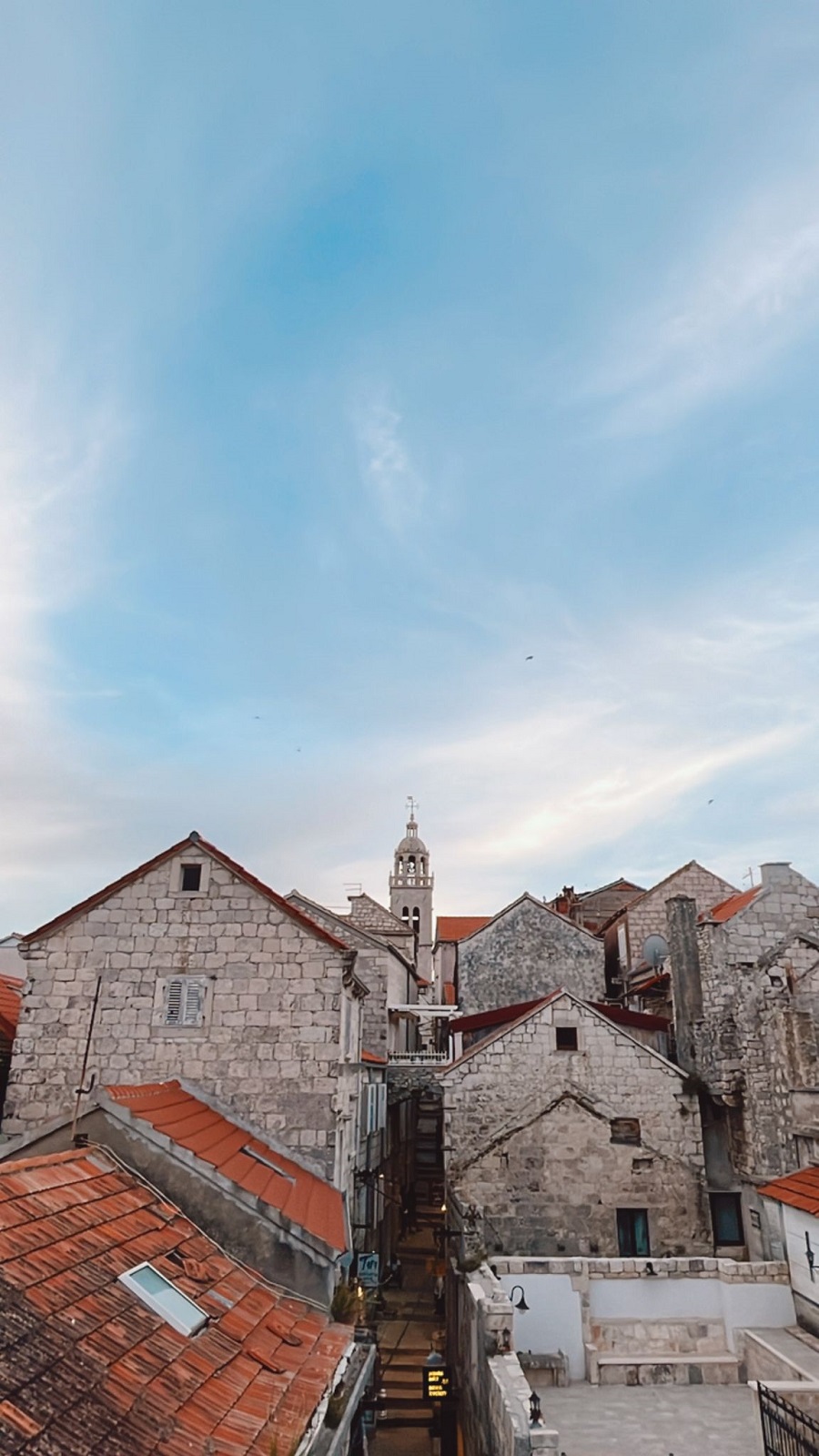
During our two-week workation, we’ve had the pleasure to stay at Korčula Hill — a self-catering luxury apartment complex just a short drive from Korčula Old Town. They provide discounted offers for long-term stays to attract more digital nomads starting for as little as $200,- per person / month for a 2- or 3-bedroom apartment.
The modern and well-equipped apartments provide everything you need: from high-speed Wi-Fi, fully-equipped gym, tennis & basketball court, bicycle rental, and two outdoor swimming pools with amazing views of the Pelješac peninsula. Follow the trail just behind the building for a short hike with a gorgeous view!
As a guest, you’ll also get free access to the sunbeds at La Banya beach, which is the perfect place to relax or do a bit of work from their restaurant or terrace bar serving delicious stone-oven baked pizzas and home-made ice tea.
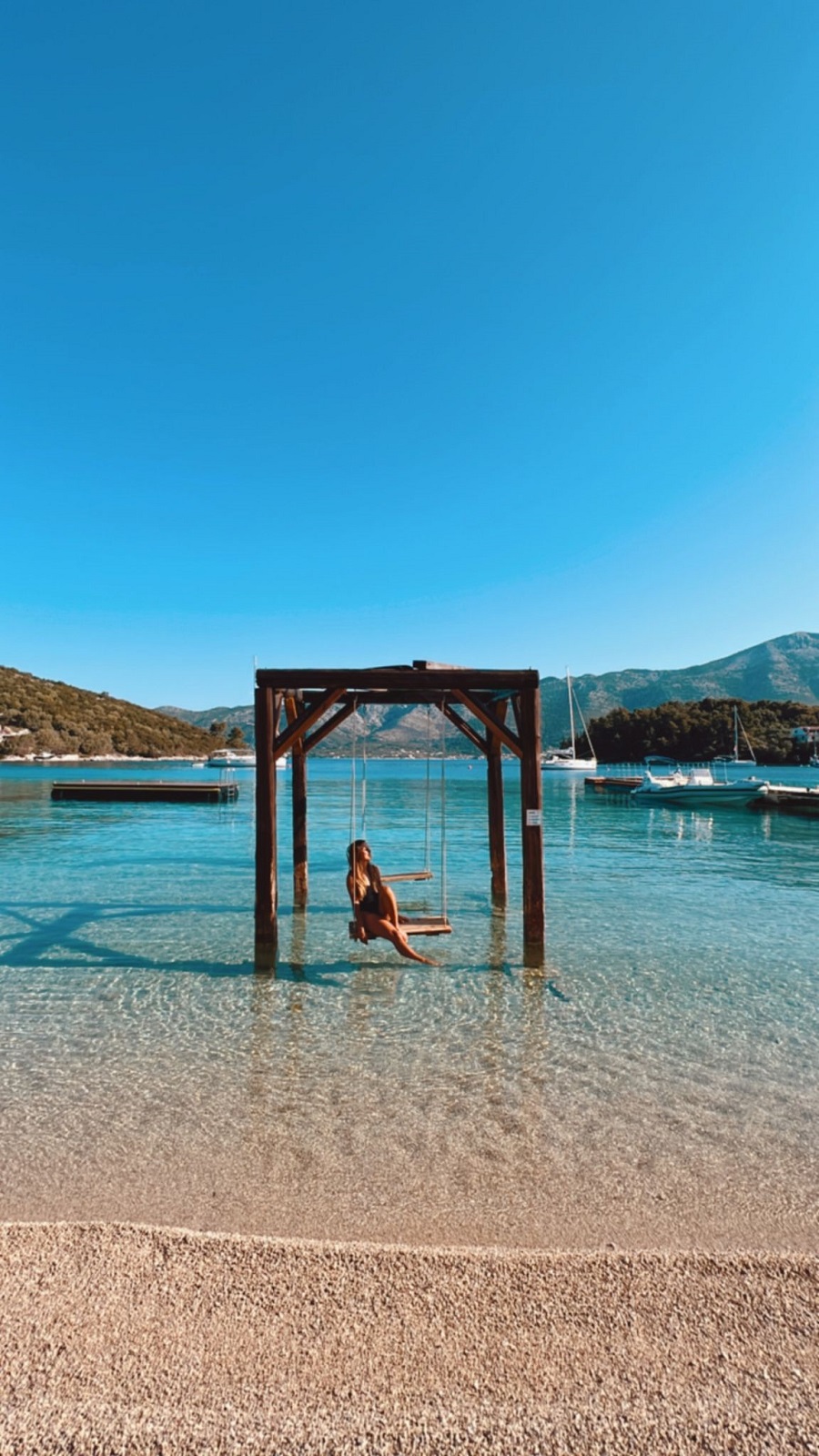
If you’re looking for a more budget-friendly option, we highly recommend this Airbnb in Medvinjak, a two-bedroom apartment only a 15 to 20 minutes walk from Old Town with a spacious terrace and an amazing view perfect for stargazing at night! And the best part: it’s a stone's throw away from small, semi-private “hidden” areas to enjoy a dip in the sea before, during or after work (or, all!).
Last but not least, if you’re looking for a honeymoon-worthy luxury experience we highly recommend LD Palace, a lovingly restored 18th-century palace now offering five unique residences for those wishing to escape, relax and unwind. We stayed at Arabia, a one-bedroom residence providing a 360-degree sea-view, fully equipped kitchen, an en-suite bathroom with walk-in shower and bathtub, and an open plan living which makes it the perfect romantic getaway.
Where to eat:
Korčula is known for its traditional “konobas” and, of course, fresh seafood making it the perfect place to enjoy unique and delicious gastronomy.
A must-visit is Konoba Maha — a traditional, family-owned restaurant run by two brothers serving locally produced food and wine passionately prepared with fresh ingredients from the land located in the middle of nature surrounded by nothing but serenity. It’s a 10-minute drive from Old Town, but it’s worth every second! Try their signature lamb dish or T-boke steak perfectly paired with a red oak wine.
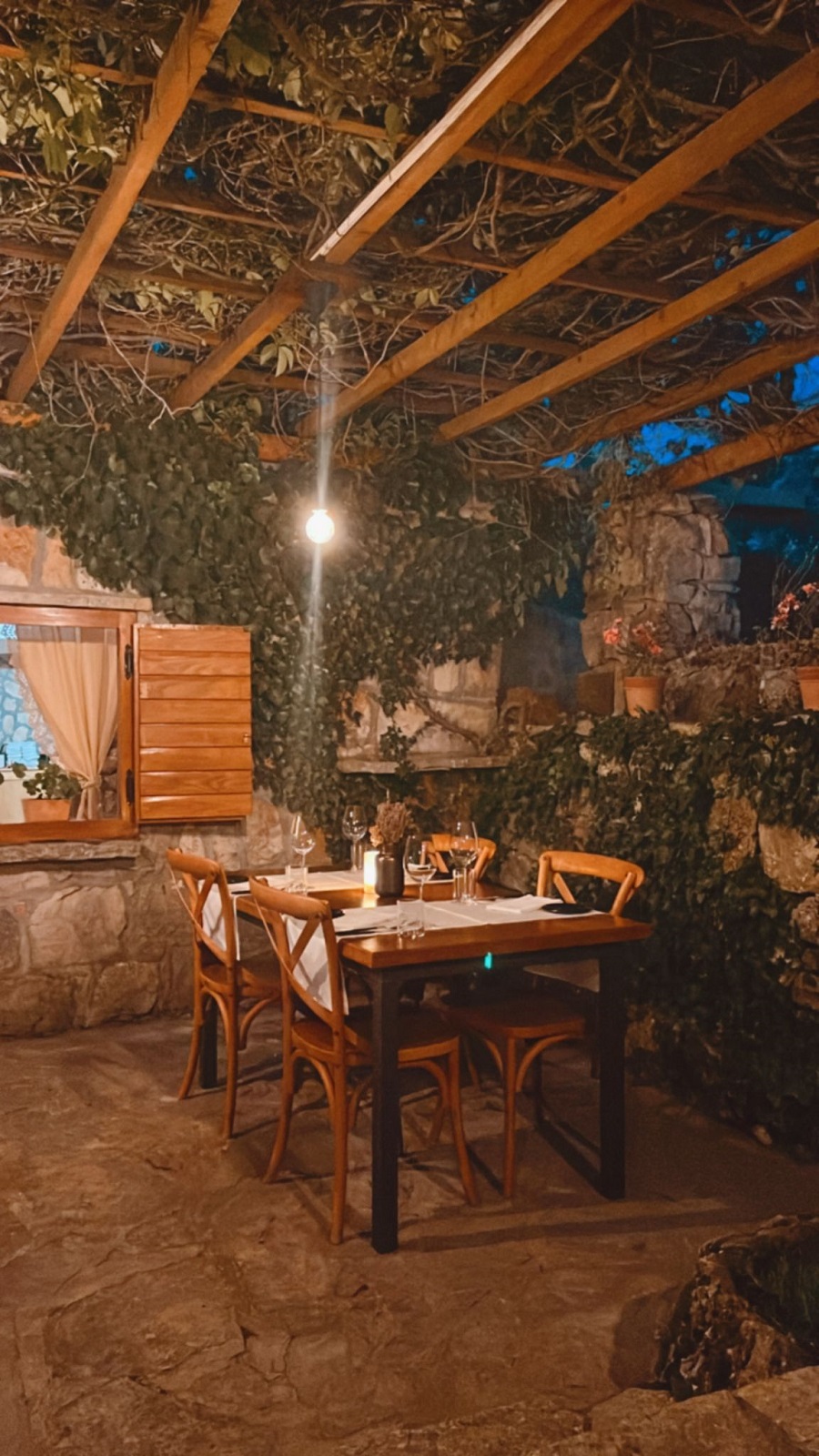
Another one of our favorites is Eko Skoj — a “from land to table” organic eco-farm owned by a mother and her kind daughter (Jelena Marović) and their wonderful team. You can walk through the flourishing garden to find a diversity of vegetables, fruits, and herbs. We even got to eat fresh cherries from the trees! Try their delicious homemade bread and order several dishes to share; a true gift for the eye and so nourishing for the tummy.
One of our favorite restaurants in Old Town is Aurora and their next-door coffee shop Aurora Sweets providing gluten-free, refined-sugar-free and dairy-free treats. Although the Wi-Fi is not very strong (yet), it’s a fantastic option to get some thoughts on paper and switch work environments with a stunning ocean view. Note: the coffee shop is only open until 3 PM — make sure to be there on time!
If you’re looking for a luxury Michelin-starred experience, then you need to visit LD Restaurant. Their wonderful staff members are incredibly attentive and passionate, serving the most Instagrammable chef’s tasting menus depending on seasonal products (definitely try their foie gras if you have the chance!). Their surprising flavors and combinations make you eat every bite so mindful to appreciate the taste so dearly. You can also rent their traditional Kata boat for a unique (romantic) dining experience in the Adriatic Sea surrounded by islands.
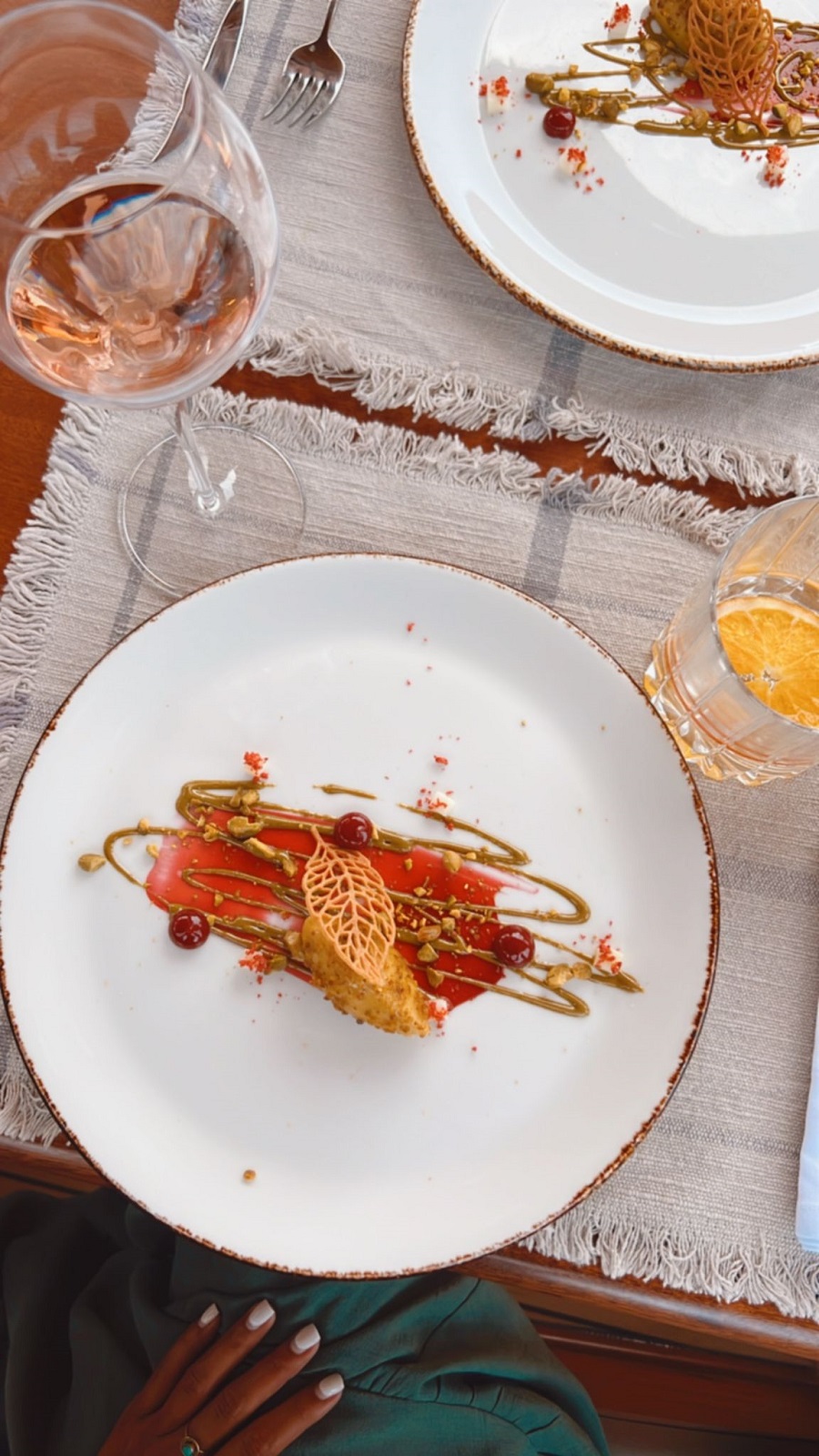
A few other favorite places include Konoba Mate, Bistro Maha, Vrnik Arts Club (ask for their freshly baked homemade bread!), and Adio Mare for the best catch of the day (if you’re lucky, highly recommend the Amberjack – truly delicious!).
Where to work:
Since Wi-Fi speed is not optimal (yet!) on the island, having a work-friendly home office is essential. Hence, make sure to find accommodation with high-speed Wi-Fi and enough workspace such as Korčula Hill or, before booking an Airbnb, ask the hosts to check speedtest.net for ideally a minimum of 50 - 100 Mbps.
You can also work from one of the restaurants or coffee shops in Old Town such as Aurora Sweets or Hotel Korčula where locals come for business meetings in this beautiful, monumental building. Another option is Korčula Town Library where the owner Ivan Vidali provides co-working space for about 5 Euros per month. In autumn 2022, it is expected their larger coworking space will be open too.
Things to do:
Whether you’re seeking adventure or looking to relax and recharge — Korčula island offers endless experiences making it a perfect all-year-round destination!
Here are a few of our favorite activities:
- Go for a City Tour with Korčula Tourist Board to walk through the cobbled streets of Old Town and learn more about the history, culture, and traditions. Don’t forget to take a picture in the famous Ulica Ismaelli — the most Instagrammable street in Korčula!
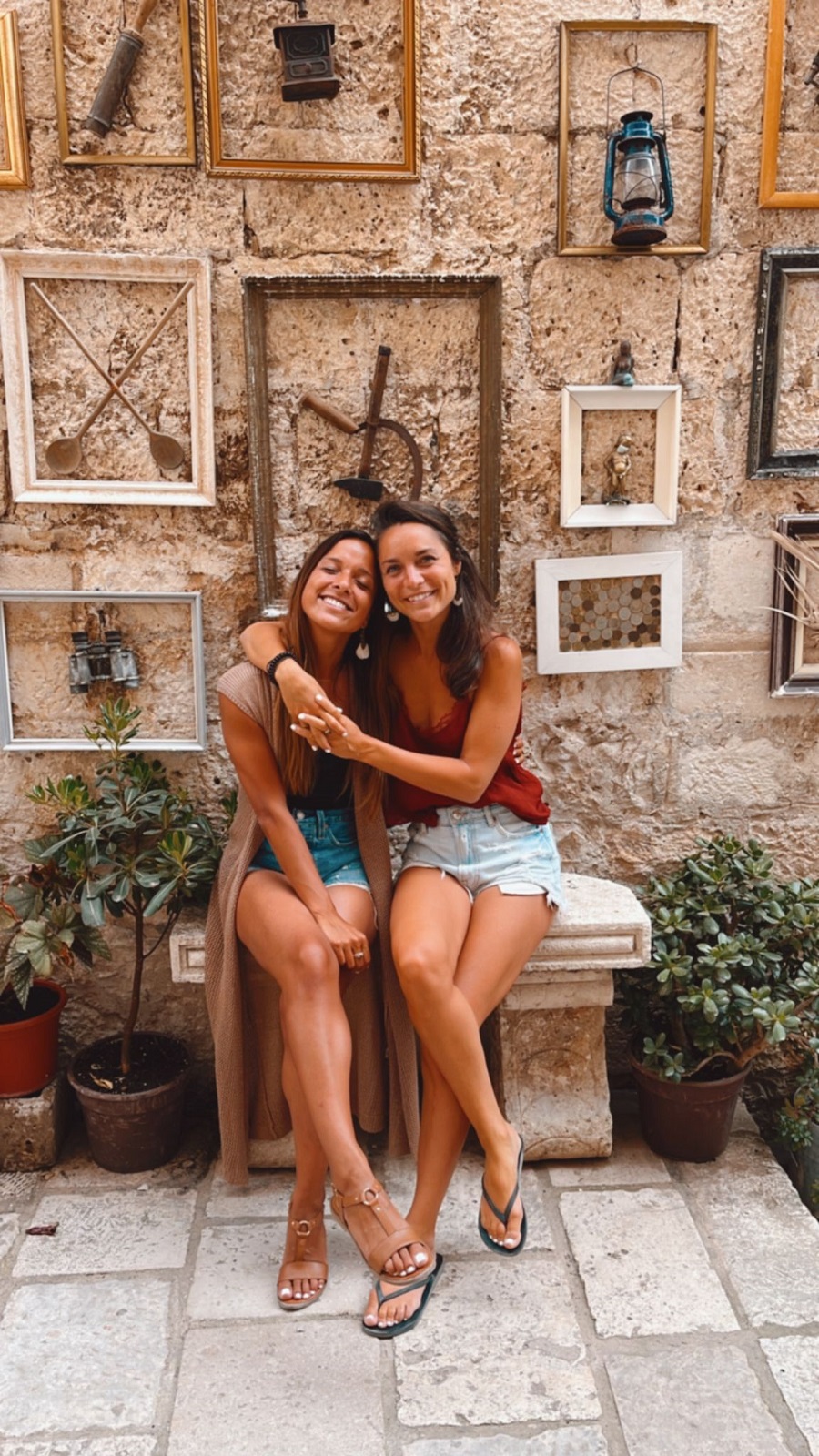
- Visit a local bee farm at OPG Komparak. You can enjoy a 45-minute workshop to learn about local honey and olive oil production for as little as 5 euro. You’ll even get to taste their locally produced Gin!
- Watch a Moreška sword dance performance. They say “if you haven’t seen Moreška, you haven’t been on Korčula”. You can watch a performance in Old Town on Mondays and Thursdays at 9 p.m. in July and August; and on Thursdays at 9 p.m. during off-season.
- Visit a local vineyard such as the recently opened, family-owned Tasovac winery for a local wine tasting experience. While Korčula is known for its popular Grk wine, our favorite is called Posip.
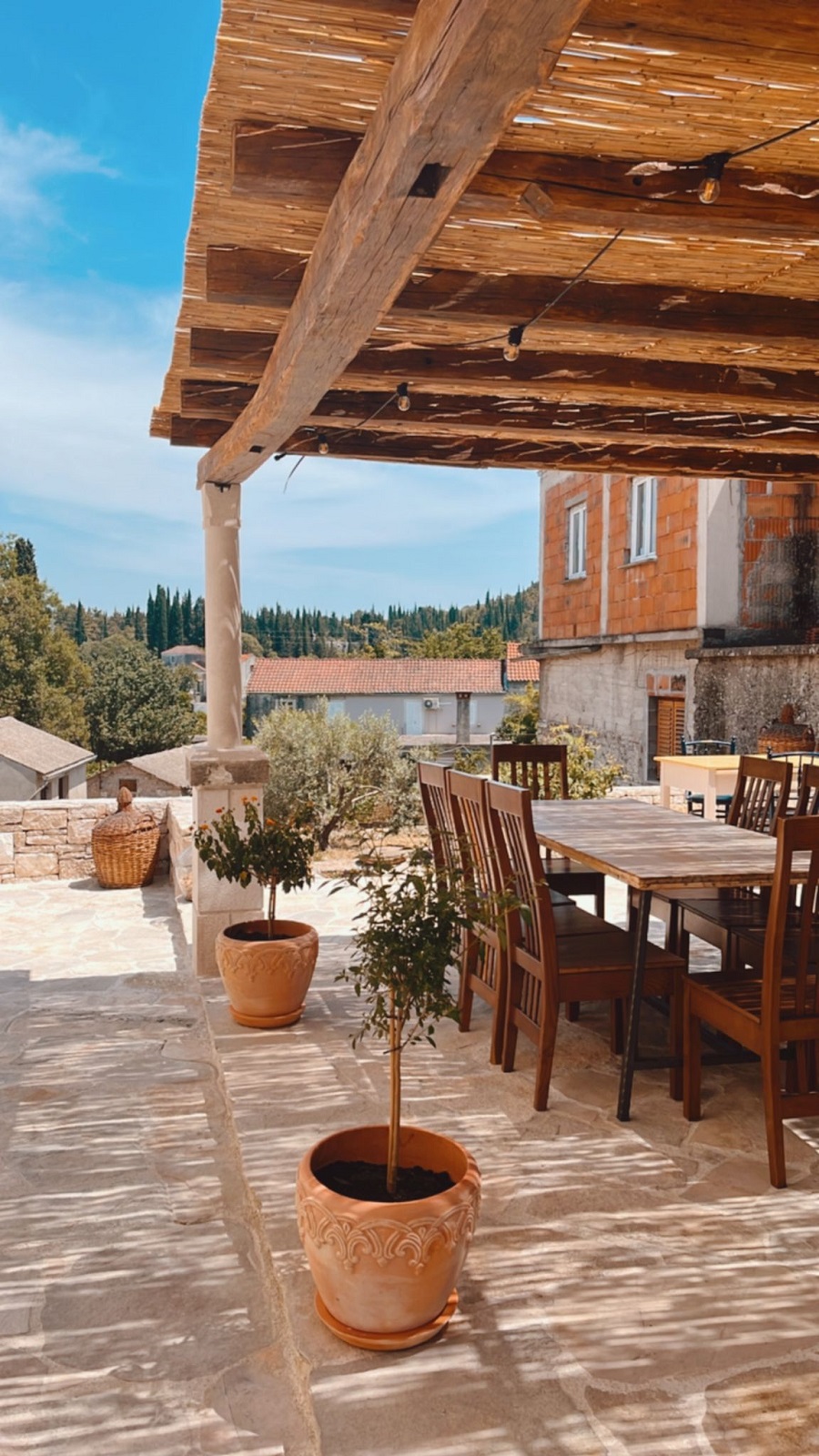
- Treat yourself to a luxury spa treatment at LD Spa such as a Thai massage or Ayurvedic relaxing massage. We highly recommend all therapists — especially Viviane from Brazil who has the purest energy and wisdom with years of experience having studied in India and has now landed her wings in the beautiful Korčula island.
- Go Island hopping to explore the nearby islands such as Badija island, Vrnik, and Stupe. You can hop on a water taxi for about 10 - 20 Euros return per person, or rent a private boat with La Banya for a half-or full-day experience visiting the most beautiful beaches.
- Enjoy an outdoor activity with Korčula Outdoor such as sailing, multi-day guided sea kayaking tours, and visits to the pristine archipelago and nature reserves. The wonderful owner Damir is truly kind and ensures you’ll have the best experience!
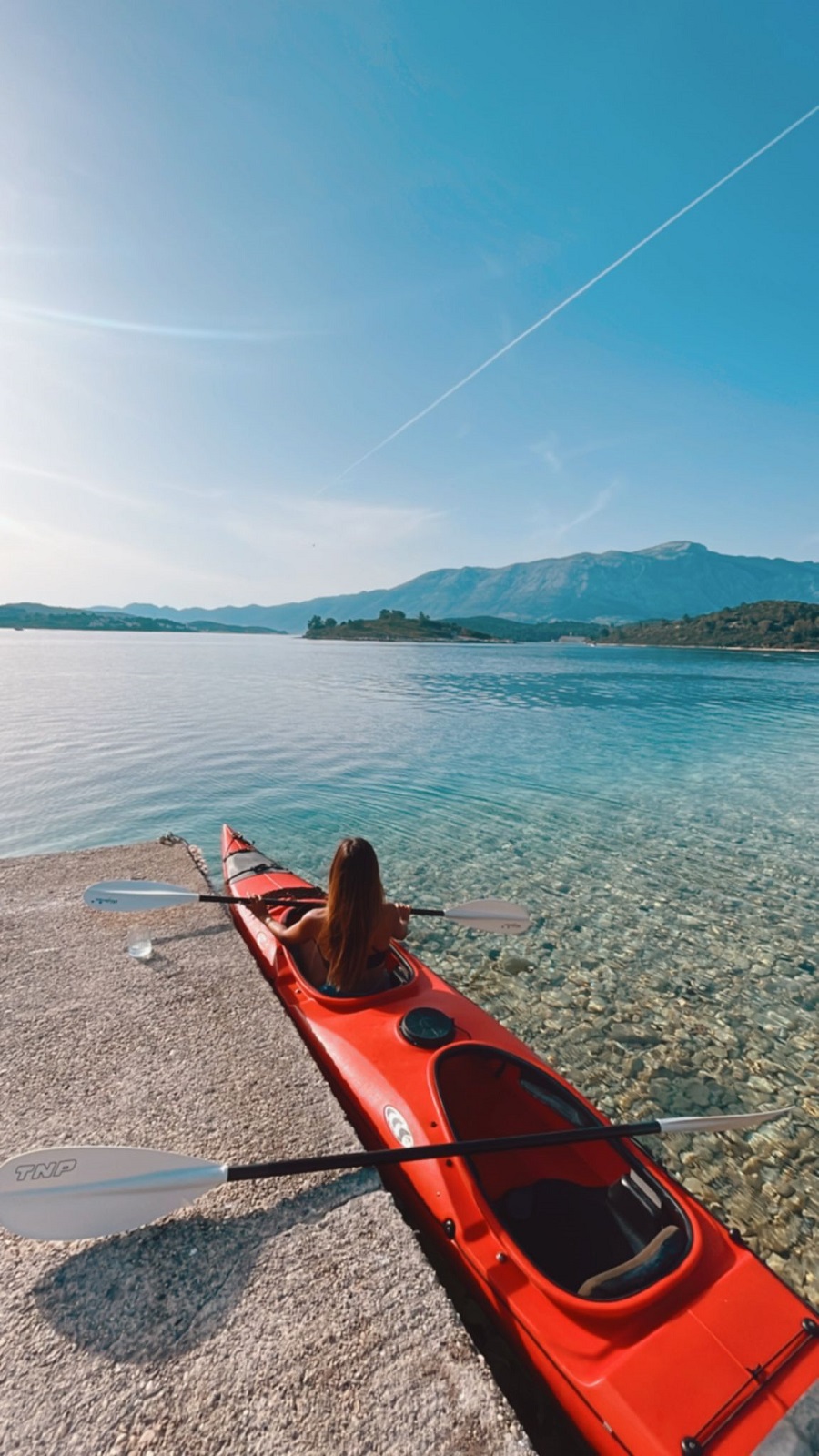
- Go beach hopping to explore Korčula’s pebble-stone beaches such as La Banya Beach, Pupnatska Luka, and Vela Luka. However, we recommend simply roaming around the island by bike / foot / car / scooter as you can find many tiny entrances and stairs to beautiful “hidden gems” with crystal clear waters. We prefer going off the beaten track, but, if you rather go to the more common beaches (also beautiful!), you can find the most recommended beaches here.
- Join wellbeing or active classes such as going for a swim at this indoor swimming pool, a yoga class with Nina at Yoga Korčula Balanca, a typical local sport at Water polo at PK Korčula (founded in 1930, they are legendary!), or a pilates class at Pilana studio by Lana — having studied and worked extensively in this field, she has a fiery but compassionate energy. Classes can be given in Croatian or English, and she offers both group classes as well as 1-1 to tailor it to the person with passion. Highly recommended!
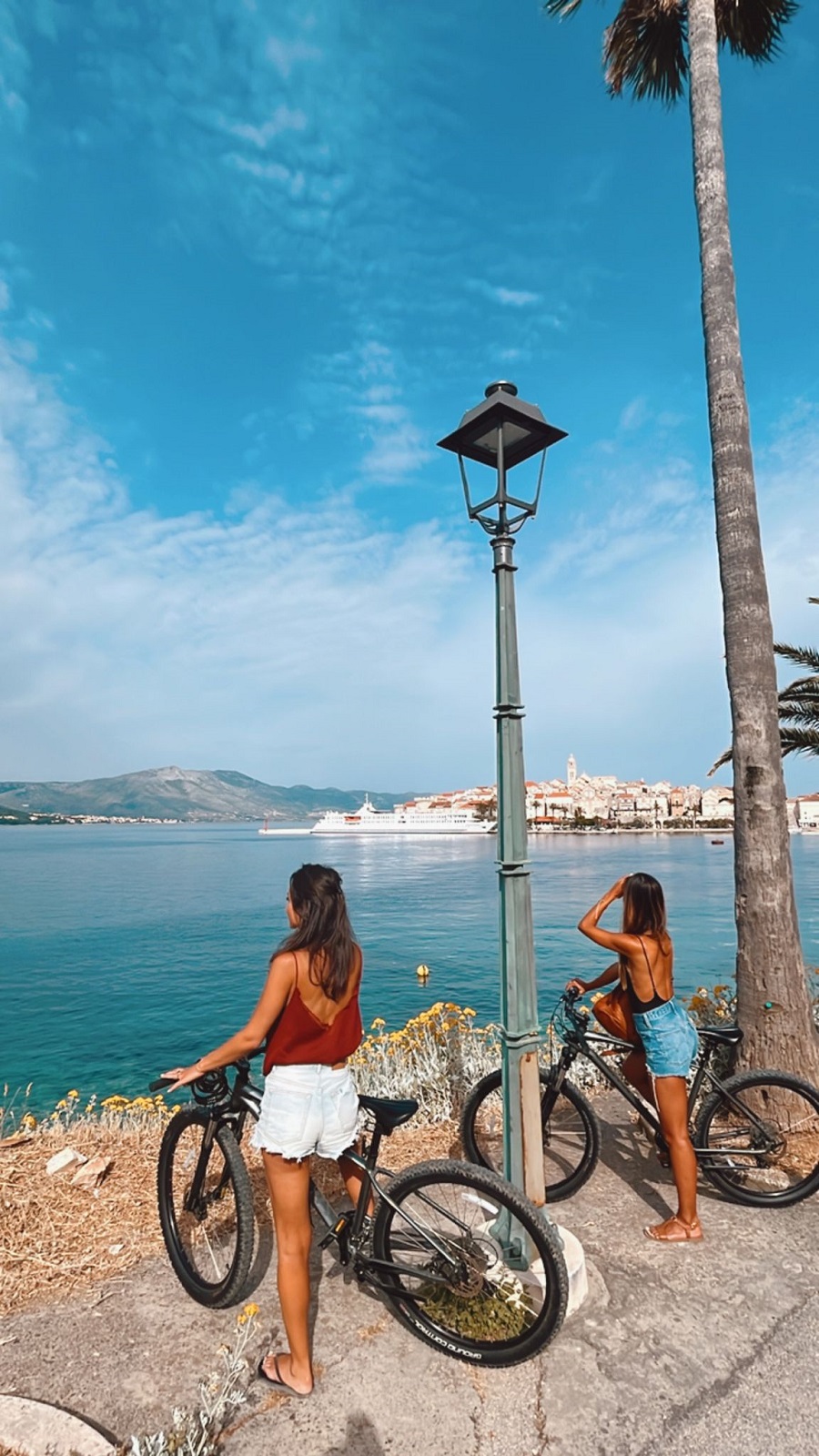
General tips & recommendations
After spending two weeks on Korčula island, it already has a special place in our hearts. It is such a safe space where you can leave your bike unlocked (yes, it’s still possible here!) and where locals still simply catch the freshest fish from the Adriatic sea themselves to enjoy with family for dinner.
Here are a few useful links for planning your (next) visit to Korčula island:
- Must see and do’s: https://www.visitkorčula.eu/see-and-do.html
- Walking experience: https://www.visitkorčula.eu/hiking-walking.html
- Cycling experience: https://www.visitkorčula.eu/bike-routes.html
- Events calendar: https://www.visitkorčula.eu/events-calendar.html
- Green market: a tiny, daily market next to the entrance of Old Town which is lovely for its fresh vegetables and fruits.
We hope this guide will help you to create the ultimate digital nomad experience in Korčula island. We highly recommend visiting off-season to escape the tourist crowds while still being able to enjoy nice, warm temperatures all year round.
Many thanks to Hana from the Korčula Tourist Board and Ivana from LD Palace for giving us a memorable, one-of-a-kind experience on this magical island :) Hvala!
This guide is written by Yvette Pelgrom and Mandy Fransz to share their top tips and recommendations after working remotely in Korčula island, Croatia as the inaugural Digital Nomad Ambassadors, a pro-bono concept designed and delivered by Saltwater Nomads, in partnership with the Korčula Tourist Board, Korčula Hill and LD Palace.
Now check out Mandy and Yvette's guide for digital nomads in Dubrovnik.
Croatia Water Polo Finishes 4th at FINA World Championships, Greece Takes Bronze
July 3, 2022 - Greece beat Croatia 9:7 in the fight for the bronze medal at the FINA World Championships in Budapest on Sunday. Croatia thus finished in 4th place.
The Croatia national water polo team met Greece on Sunday in the fight for the bronze medal at the FINA World Championships in Budapest.
Croatia and Greece already met in the group stage of this competition in Debrecen. The match finished 8:8.
By winning bronze, the Barracudas would have increased their medal count at the World Championships to eight. It all started back in 2007 in Melbourne.
In the semi-finals, Croatia was defeated by Spain, and Greece by Italy.
Match Report
1st quarter
Croatia won the sprint and thus the first attack of the match. Vukicevic's shot was saved by the Greece keeper. Bijac saved Greece's first shot on goal. Five minutes into the first quarter and neither team had scored yet. Greece scored the first goal of the match with 2:20 left in the quarter. VAR held the match up for a potential Croatia goal but the referee ultimately did not count it. The first quarter ended 1:0 for Greece.
2nd quarter
Greece won the second sprint of the match and thus the first attack of the second quarter. Greece scored for 2:0 with 7:35 on the clock. Greece made it 3:0 with 6:57 left. And it was 4:0 for Greece with 4:19 left. Bukic scored Croatia's first goal for 4:1 with 3:34 left. Greece scored for 5:1 with 3:08 on the clock. Fatovic scored for 5:2 with 2:26 left in the quarter. Kharkov's penalty was saved by the Greece keeper with less than a minute left until halftime. Zuvela made it 5:3 with 3 seconds left, which is how the match went into halftime.
3rd quarter
Bukic scored for -1 Croatia with 6:21 left (5:4). Greece scored for 6:4 with 5:51 to go. Greece went up by 3 goals again with 3:36 left - it was 7:4 for Greece. Greece made it 8:4 moments later. The Greece keeper continued to deny Croatia at the goal. Kharkov finally found the back of the net for -3 - 8:5, which is how the match went into the final quarter.
4th quarter
Croatia won the final sprint and the first attack of the last quarter. Kragic scored for -2 (8:6) with 7:21 left in the match. Greece scored for +3 (9:6) with just over two minutes to go. Bijac saved Greece's penultimate attack and Vrlic scored for 9:7 with 24 seconds on the clock, which is how the match ended. The Greece keeper finished with 16 saves.
Croatia thus finished the 2022 FINA World Championships in 4th place.
For more, make sure to check out our dedicated sports section.
Lifestyle: NomadList Shows Why Croatia Most-Liked Remote Work Destination in Europe
July 3, 2022 - Croatia is establishing itself as a leading remote work destination. The latest NomadList 2022 survey gives some clues as to why.
It is peak season in Croatia, and most of the country's tourism is focused on the traditional sun and sea tourism on the Adriatic. But away from the coast, and away from the beach, a newer, more sustainable tourism is taking route in a country that desperately needs to diversify its tourism strategy away from overtourism in the summer months on the beach.
It is about three years since I wrote an editorial called Branding Croatia for the Future: 5 Gifts and Trends to Focus On. For a country so reliant on one form of tourism, I was shocked at how much untapped potential Croatian tourism had all over the country, 365 days a year. Three years later, thanks largely to efforts in the private sector that were embraced by the public sector and - belatedly - by the official tourism board, one of those five gifts and trends is being not only realised, but showing outstanding potential to move Croatia into a new and exciting direction - digital nomad tourism. And I am sure that the other four gifts will find their moment in the sun at some point.
This week's NomadList 2022 survey gives some great insights into the digital nomad lifestyle, as well as showing just how well-positioned Croatia is to develop itself in this rapidly-expanding tourism niche. Finding reliable data about digital nomads is notoriously difficult, as they do not register as such when they travel, so it is hard to capture the data. The NomadList data is captured through its paying members and their actual movements, and is therefore one of the few good indicators available of trends within the digital nomad community. And for those willing to spend more than 10 minutes looking at the headlines, there are some rather interesting findings, most of which are very good news for Croatia.
Before looking at what is attracting nomads to Croatia, it is worth reflecting on some of the data in the survey to dispel a few myths and also to see how Croatia's approach to the visa - or permit - reflected the needs of the nomads it was intended to serve. I remember at the time that there was a lot of criticism of Croatia's requirement to have an income in the region of 25,000 euro a year in order to qualify for the permit, as this would disqualify many applicants based on income. I personally thought this figure was about right - the whole point in creating this opportunity was to bring in people who would be spending.
And it seems that the vast majority of nomads would have no problem meeting this requirement, with 77% of nomads earning more than $50,000 a year, and the average salary just under $120,000. That is some very nice purchasing power for visitors coming for an xtended period to a country.
Another criticism after the permit was introduced was how few nomads actually applied for it. I must admit I was expecting significantly more than did apply, but again the data is a good guide. With only 15% of nomads staying more than 3 months in a country, the number of applications for a whole year is necessarily going to be low. And with 82% spending between a week and 3 months, most don't need to apply for any additional permits other than any normal entry visa.
High net worth individuals spending around two months in a country on average - and not necessarily in the summer on the beach - is a niche to be cultivated. So what makes nomads tick, and does Croatia have anything to offer them? Oh yes... indeed, it almost seems as if the spec was written with Croatia in mind. The big concept I took from this survey was the search for lifestyle.
Here is how male and female nomads describe themselves by interests. Do you think any of these might fit into the Croatian lifestyle?
Top of the list for both male and female nomads is the epicentre of Croatian culture - coffee.
I have never lived in a country where the coffee culture was so culturally engrained into society as in Croatia, and I constantly marvel at how my Croatian colleagues can make an espresso last an hour as I sink four beers in the same time. Comparing life in a Starbucks in the States to the relaxed cafe culture in Croatia has to be one of the great cultural divides, and I have lost count of the number of American nomads who wonder at the beauty and friendliness of the Croatian coffee scene, where new friendships are made daily over a cup.
Also rating very highly are two of Croatia's great natural strengths - hiking and the outdoors. With over 10% of the entire country given over to national and nature parks, Croatia's attractiveness as a great outdoor destination is without question. Outstanding hiking opportunities such as Sljeme in Zagreb, Marjan in Split and Stari Grad Paklenica by Zadar are all very accessible from popular nomad cities, while the many parks of Zagreb are also very popular.
Beer and Wine. Welcome to Croatia, the birthplace of Zinfandel, one of 130 indigenous varieties in an increasingly homogenous world. And for a country with a better emerging craft beer (and gin) scene, one would have to search a little. Many of Croatia's wine experiences are authentic and unique, small family growers only now discovering international markets. They are a joy to discover.
One of the other gifts and trends to work on from that editorial three years ago was Croatia's potential as a sporting tourism destination. And looking at what gets nomads active, it seems to be a match made in heaven. Croatia has outstanding options in almost all of these sporting activities. It almost feels that Croatia is a country designed by a digital nomad wishlist.
Add to all this, of course, the many other attractive aspects of Croatia's offer - its safety, excellent English, great WiFi, affordability, accessibility, culture, natural beauty - and no wonder that Croatia is starting to figure more prominently as a remote work hot spot in Europe. And let's not forget the huge potential of Croatia's excellent medical tourism industry (yes, also one of the five gifts in that 2019 editorial). If remote workers realised the quality and price of dentistry, cosmetic surgery, eye surgery, and a host of other medical procedures, they could build that into their Croatian experience, saving lots of dollars and discovering yet one more reason why the future of sustainable tourism away from the beach in Croatia is looking brighter than ever before.
Learn more in Medical Tourism, the Hidden Gem in Croatia's Remote Work Revolution.
For more news and features about digital nomads in Croatia, follow the dedicated TCN section.
Zagreb Fastest Growing Remote Work Hub in Europe: NomadList 2022
July 3, 2022 - Zagreb's nomad credentials are enhanced once more, as the NomadList 2022 survey names the Croatian capital as the fastest-growing remote work hub in Europe over the last 5 years.
Good things are happening in Zagreb, a city which is changing immensely and becoming seriously cool.
I used to think that Zagreb was a pretty dull place (and 15 years ago, it certainly was less interesting than today), but the last decade has seen the Croatian capital transformed into one of the truly fab places under the radar in European tourism. But that discovery has started.
Having lived here for a year now, it has become probably my favourite place I have ever lived in the 10 countries I have called home on my travels over the years. The safety and the lifestyle are all that they have always been, but an increasingly cosmopolitan feel to th city, both in gastronomy and residents has given the city an extra something. It is a city that continues to surprise visitors, including digital nomads, whose expectations are normally exceeded by a visit to the city. As the self-proclaimed King of Digital Nomads, Israeli Dean Kuchel, commented after a week here last year: "Zagreb has everything one might need for digital nomads, except one thing - more digital nomads."
Those nomads are coming, and one of the most positive findings from this week's NomadList 2022 survey is how well Zagreb is evolving. Named in the top 5 most-liked cities globally in the survey, Zagreb is showing its nomad growth in other ways, being among the fastest-growing remote work hubs in the last five years in the world, and the fastest in all Europe.
A large part of that growth came last year, the same year as the inaugural (and award-winning) Zagreb Digital Nomad Week. The 2022 edition of ZDNW will take place later this year - follow the official website for details.
And, although the data is the same, Zagreb is also featured in the top growing remote work hubs with affordable real estate which foreigners can buy. Something for nomads who fall in love with the city and looking for an investment to consider.
According to the NomadList data, which is extrapolated from real-time data from their users, the trends for Zagreb are looking very healthy indeed (this data is taken from their own registered users).
Looking for somewhere to work when you come to Zagreb? Check out the TCN guide to Zagreb co-working spaces.
For more news and features about digital nomads in Croatia, follow the dedicated TCN section.
Learn more about this magnificent city in the Total Croatia Zagreb in a Page guide.
NomadList 2022: Croatia #1 in Europe, Zagreb, Split, Hvar, Zadar, Dubrovnik in Top 10s
July 3, 2022 - The NomadList 2022 State of Digital Nomads report is out - and there is lots of good news for Croatia.
It is hard to imagine that a little over 2 years ago, the term 'digital nomad' was almost unheard of in Croatia. An open letter to the Prime Minister from a Dutch entrepreneur in Split asking for a digital nomad visa changed all that, setting in motion a chain of events where the term 'digitalni nomadi' is now a widely recognised term in the Croatian language by the majority of the population.
And the nomads are coming... and liking what they see. Award-winning events such as the Dubrovnik Digital Nomads-in-Residence programme and Zagreb Digital Nomad Week have helped to put Croatia on the remote work map, and Croatia is now featuring regularly in the top places to enjoy the remote work revolution.
Getting accurate data about how many digital nomads there are, where they travel to, and what their preferences are, has been a challenge, however, as such data is not captured by traditional data collection methods. One of the most respected sources of data, collected in real time from actual registered nomads, comes from one of the leading websites catering to the digital nomad community - NomadList.
Last year, NomadList released a major survey about the digital nomad lifestyle, extrapolating data from their members, and there was plenty of good news for Croatia. As TCN reported at the time, Croatia was placed second as the most liked country for nomads behind Japan, while Zagreb made it to the top 5 most-liked cities in the world (and the first in Europe). You can read more analysis of last year's survey here.
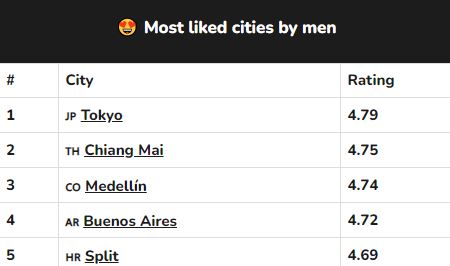
The NomadList 2022 survey has just been released, and there is LOTS of good news for Croatia, as well as evidence that the remote work revolution is spreading around the country. In addition to Croatia being named as the most-liked country in Europe again (and globally number 2 behind Japan), no less than five Croatian destinations make it into one of the top 10 lists in the survey - Zagreb, Split, Dubrovnik, Zadar, and Hvar.
An explanation about the data for the NomadList 2022 survey from the website itself:
In this report, we try to figure out who these people are, what work do they do, and how they spend their life based on data from tens of thousands of Nomad List members. In this report, we try to figure out who these people are, what work do they do, and how they spend their life based on data from tens of thousands of Nomad List members. This page is built LIVE with data pulled straight from the database every day, so it's always up-to-date. Conclusions you can derive from this are always limited and merely indicative but possibly interesting. Nomad List is a paid membership community, which means there's a selection bias as people who do not or cannot pay are not in the dataset. On the other hand, free digital nomad communities, like on Facebook, require no commitment to join, therefore it's not clear if these people are merely aspirational or active nomads or not. On Nomad List we can confirm they are active based on their travel logs.
You can see the full report here.
I won't pretend I fully understand the criteria behind what defines attractive men and women, but I include it as it shows that other destinations such as Hvar are now being discovered. There is a real buzz about Croatia at the moment, and several destinations are now joining the remote work revolution, and I would fully expect several more Croatian destinations to be part of the 2023 survey.
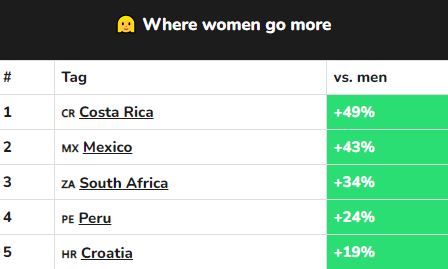
One interesting list was that of Croatia's inclusion at number 5 in the destinations where female nomads go more than male nomads, a nod I think to the fact that Croatia is a very safe country in general, with many female travellers commenting on how safe it feels to travel around.
Perhaps the most satisfying find of all, however, is the rise of Zagreb, Europe's fastest-growing remote work hub in the last 5 years, and the fourth fastest in the world. With much of that growth coming last year and coinciding with the inaugural Zagreb Digital Nomad Week, it is hoped that this year's ZDNW in October will continue that trend.
For more news and features on digital nomads in Croatia, follow the dedicated TCN section.
Wild Croatian Mammals and Where to Find Them
July 3, 2022 - It is no secret that Croatia is home to many animal species, thanks to the diversity of its ecosystems. Although many of these animals are difficult to spot in plain sight, we're going to tell you about some fascinating wild Croatian mammals that inhabit this country.
Usually, the countries that boast the most biodiversity are those with more tropical climates and ecosystems, and while they have the right to do so, don't think that other countries like Croatia can't surprise you with their diverse wildlife. According to the AZ animals website, ''it is estimated that Croatia contains some 50,000 to 100,000 species of both plants and animals, some of them completely unique to the country. Wolves, bears, foxes, wild boars, weasels, and wild cats inhabit the inland forests and plains, while reptiles and marine life can be found near the coast''.
If I can tell you one thing in my almost three years living in Croatia, it is that this wildlife is hard to spot. When it comes to Croatian mammals, you will have more chances to see domesticated animals like sheep, goats, horses, or cows on the farms and in the fields. Believe me, if I have ever seen a wild animal in Croatia, it is most likely that I have seen it on a Croatian national or natural park social media account, or in a viral video circulating on Facebook.
While it is best to leave things as they are and let these wonderful creatures roam their habitats undisturbed by humans, you will surely find it interesting which wild Croatian mammals inhabit the country.
Balkan lynx
Did you know that the Risnjak National Park could have been named after this animal? The name of the lynx in the Croatian language is ''ris'', and this national park is one of the many habitats of the lynx in Croatia. The Balkan lynx (Lynx lynx balcanicus) is called like so because it inhabits a large part of the region, with a greater population in countries such as North Macedonia, Albania, Kosovo, and Montenegro. In Croatia, it can also be found in the Velebit or Paklenica National Parks.
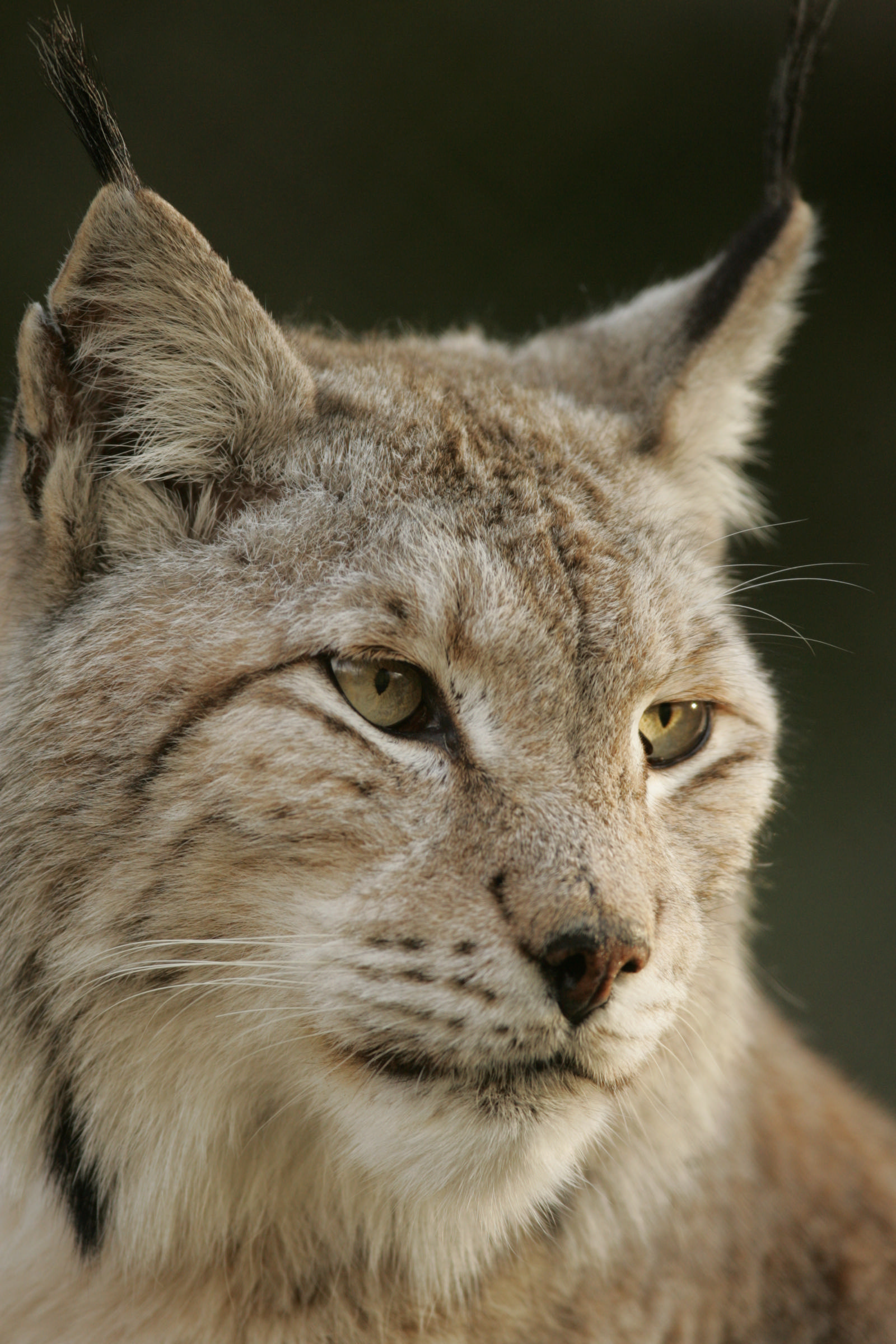
Photo: Mario Romulić
The Balkan lynx is a medium-sized feline with large, pointed, and highly distinctive ears that generally feeds on rabbits, birds, and rodents. One of the reasons why their sighting is difficult is due to their solitary behavior since they do not usually walk in groups. Another reason, unfortunately, is the decline of their population in the country due to hunting, road accidents, and lack of food, which puts them at risk. It is currently estimated that there are no more than 50 lynx in the country.
Brown bear
Croatia is home to approximately 900 brown bears, the largest European carnivore. Although they can be found in most mountainous and forested areas, as well as in bear sanctuaries such as Kuterevo, brown bears (Ursus arctos) find better refuge in the wide and thick forests in the Gorski Kotar region or Plitvice Lakes. Brown bears are large predators, which can grow up to 2.40 meters tall and weigh up to 390 kilos, and feed mainly on fish, fruit, and insects. Although they appear slimmer in the spring, brown bears in Croatia can eat up to 40kg of food to prepare for winter.
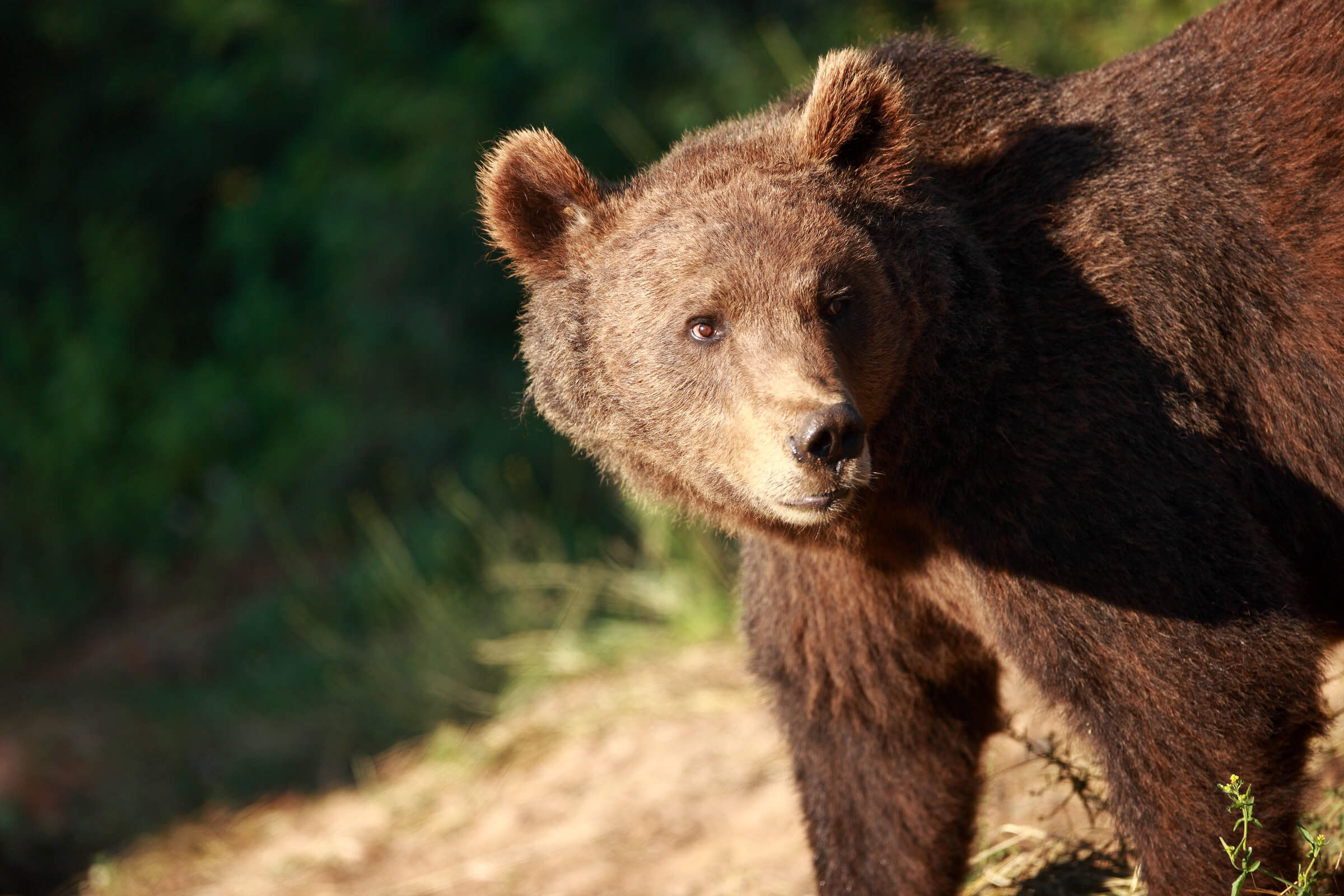
Photo: Mario Romulić
Brown bears are also hard to find out in the open, the males are solitary and the females make sure to keep their cubs safe. It is best to avoid any kind of close encounter with any brown bears in Croatia as it can be very dangerous. Therefore, visiting the bear sanctuary in Kuterevo, located just outside Otočac in Lika-Senj county, is a great opportunity to safely see brown bears and learn more about their conservation.
Wild horses
Everyone has seen at least one horse in their life. When we talk about domestic animals, the horse (Equus caballus) is one of the most recognizable even by little ones. In Croatia, a country with many rural traditions in all its regions, horses continue to be of great support on farms and fields. But did you know that in Croatia there is a remarkable number of wild horses roaming the fields and mountains? Well yes, and in Croatia, wild horse populations have been protected a lot and constantly.
Although there is not much difference between the appearance of a wild horse and a domestic one, the behavior between the two is quite contrastable. Wild horses are not aggressive animals, but contact with them definitely requires extra caution. For example, in the wild, males tend to herd several females and protect them from other males, which is why they can be quite protective. Wild horses can be seen more frequently than lynxes or brown bears, for example when hiking in a National Park such as Risnjak, Velebit or Paklenica, in Nature Parks such as Biokovo, or roaming in large fields. In Croatia, there are organized tours to appreciate wild horses from a distance.
Pine marten
While we are familiar with this animal by its common name, the pine marten (Martes martes), it may make more sense to you to know that this is the famous animal known as the kuna in Croatia. The pine marten is not only the name given to the Croatian currency, but it is also an important symbol in the country, and officially the national animal. If you've never seen or heard of one, the pine marten is a small omnivorous mammal that closely resembles a weasel. Pine martens are solitary and generally feed on birds, insects, bird eggs, and fruit.
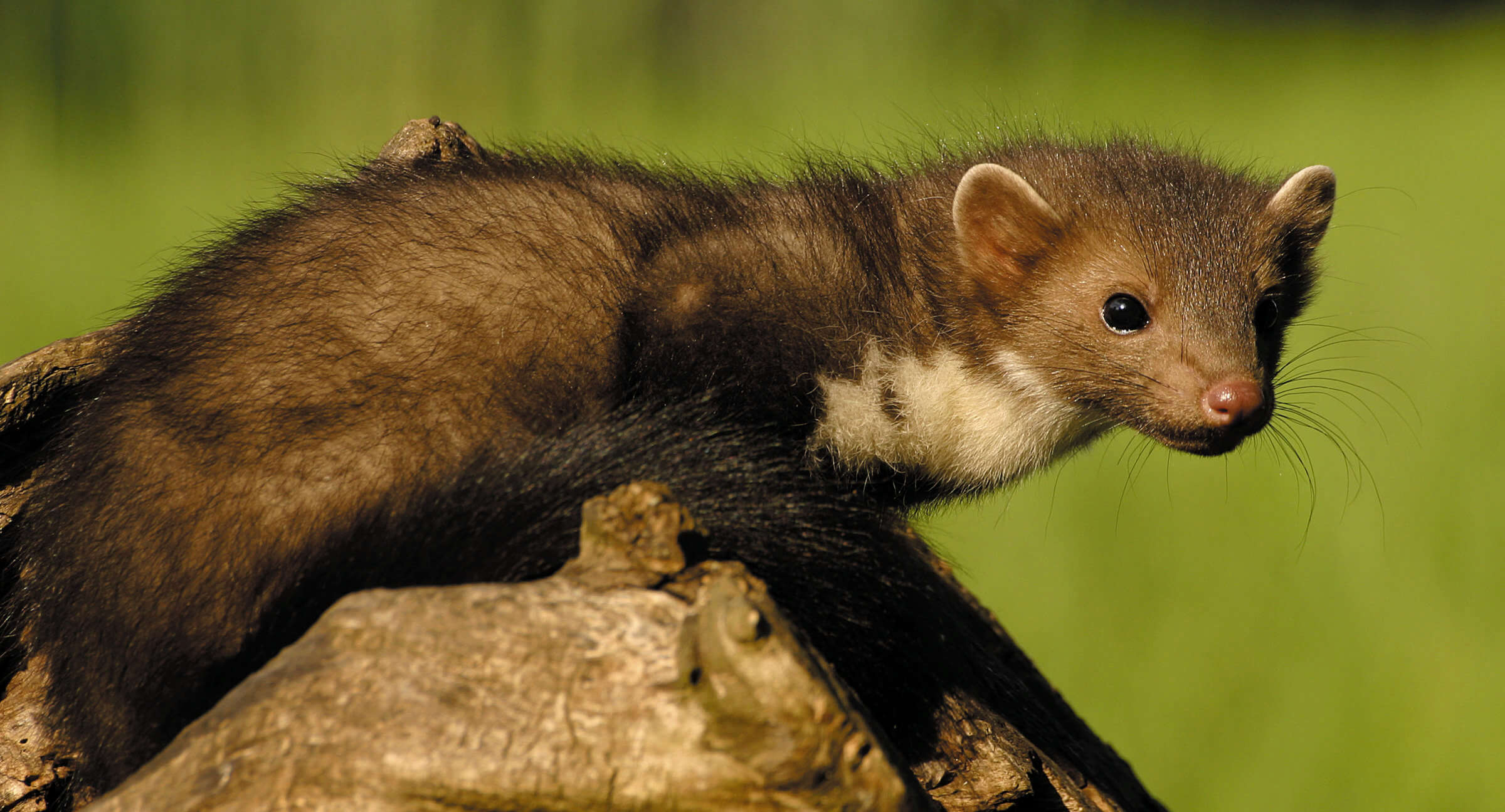
Photo: Mario Romulić
Pine martens are very slippery and agile and have the ability to jump from tree to tree similar to squirrels. However, despite this and their solitary personality, they are animals that can also fall into the hands of a predator, such as foxes, owls, or even birds of prey. Unfortunately, they can fall victim to animal traps set by humans. However, they are not endangered animals. What yes, is that they are very difficult to find in the wild.
Wild boar
Wild boars (Sus scrofa) are very common in Europe, and they are definitely not strange to Croatia. They are a species of wild pigs and live mostly in forests where they feel safer. However, if necessary, wild boars easily adapt to other territories due to their diverse diet, feeding on basically anything that will fit in their mouths. And that is verifiable in Croatia, where wild boars have been seen in the most wooded areas, but also swimming near Makarska, which proves them to be agile runners and also daring swimmers.
Wild boars feed mainly on berries, roots, and worms. Contrary to popular belief, wild boars are not aggressive but may react if they see themselves or their piglets under threat. Among the species mentioned in this article, wild boars are surely the easiest to find, but discretion is recommended, and respect for their habitat. Although they are not considered endangered animals, wild boars are animals that are often popular hunting objects in Croatia.
For more, check out our lifestyle section.
Hvar Students Develop Game, HANFA Awards Creativity
July the 3rd, 2022 - A group of Hvar students have been awarded for their creativity in a game designed to work on financial literacy skills by Hanfa (The Croatian Financial Services Supervisory Agency).
Croatian students from up and down this country certainly pack a punch when it comes to innovation, creativity and coming up with very impressive ideas. With financial literacy being a burning issue among the younger population, these students certainly stand out from the crowd when it comes to money management skills.
As Poslovni Dnevnik writes, a game called Desitudo created by a group of Hvar students attending the Petar Hektorovic Elementary School on the aforementioned Dalmatian island recently won in a competition called "Financial literacy through play", which was conducted by the Croatian Financial Services Supervisory Agency (Hanfa). The school won the prize - a smart board - with the winning game designed by these talented Hvar students.
Elementary schools from across the Republic of Croatia participated in the competition, and eighteen applications were received in total. As part of the competition, upper elementary school students and their mentors had to design a board game with the aim of raising the level of students' financial literacy.
The committee for the evaluation of the works pointed out that the students put in a lot of effort, employed their skills in terms of creativity, but also knowledge, and they are extremely satisfied that financial literacy is being considered from an early age to be extremely important as a skill to develop for life.
The game designed and brought to life by the Hvar students from the aforementioned winning school stood out for its creativity, good examples and learning outcomes. The game primarily helps students to recognide the differences between wants and needs and helps them to manage their money more responsibly.
For more, make sure to check out our dedicated Made in Croatia section.


